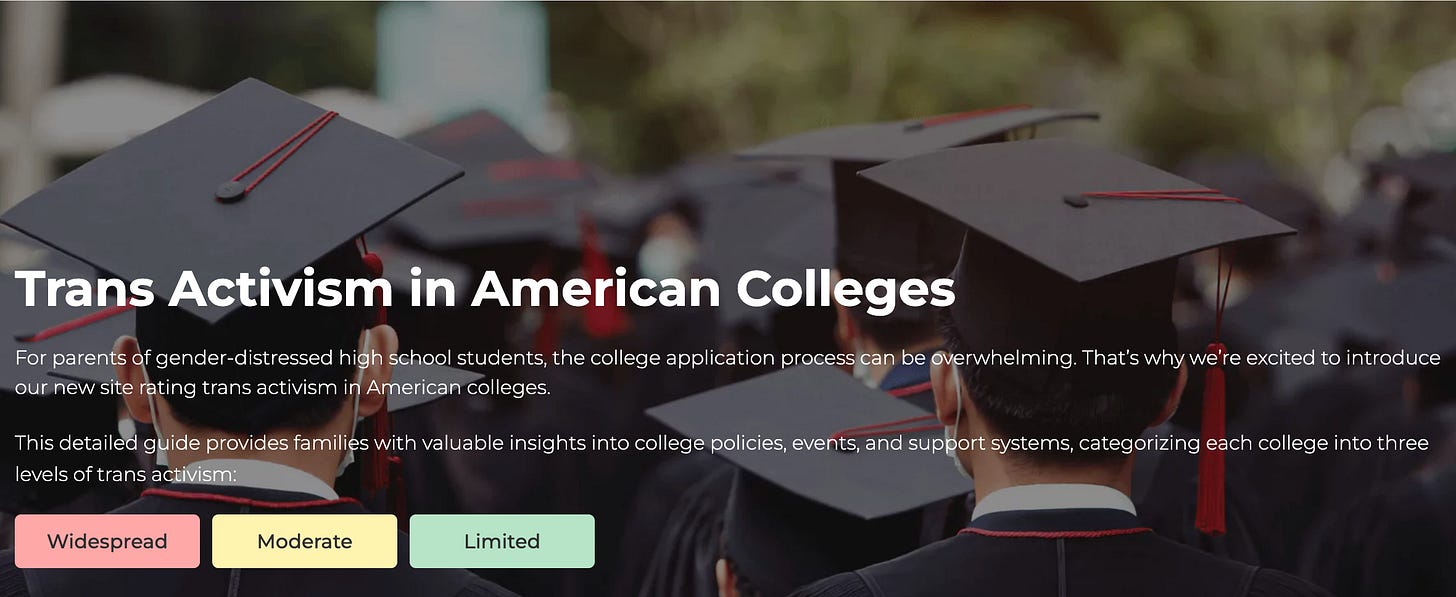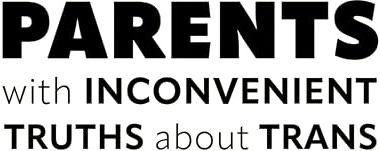When Your Trans-identified Son goes to College
An anonymous parent shares the highs, lows and the unexpected

As of May 1st college-bound seniors in American high schools are breathing a sigh of relief — and so are their parents. They’ve accepted an offer, sent in a deposit and they know where they will be headed in next fall. But for parents of students who struggle with gender distress there is no such sense of relief. Adjusting to college life is challenging at the best of times, for for trans-identified young men and their parents the future is full of unknowns. There are no easy answers for how to proceed, but these observations from a parent who has been there can help.
Sending a child off to college is always slightly terrifying, but that terror increases by orders of magnitude when your child is dealing with gender dysphoria. Raising my son has taught me—sometimes on a daily basis—that control is an illusion. Sending him away to college was very difficult and only lasted one year, but I’m very glad for both of us that we tried it. Here’s what I learned.
Don’t Rush It
Like many parents of autistic or neurodivergent boys, I have learned my son moves at his own pace. He met developmental milestones at the outer edge of typical, often just when I feared he might not. He’d sometimes try to please me, but I realized nothing would happen until he was ready—college included.
His decision to take a gap year worried me. I feared he’d lose momentum after a tough high school experience, where accommodations fell short of promises. COVID disrupted his sophomore year, and in March of his senior year, he texted me that he identified as a girl.
I suspected he saw his gap year as a time to transition, perhaps envisioning himself entering into a hormone-induced chrysalis stage ready to emerge in time for collage as a fully-formed and confident trans woman. I urged him to delay hormone therapy until he was older, but he accessed it through Planned Parenthood. To my relief, it wasn’t all bad. He also thrived in a part-time job he loved. He applied to colleges independently, was accepted to two, and chose a large state university three hours away.
A life coach supported him during the gap year, and I assisted with some logistics, but he largely managed the application process himself. I stepped back as much as possible. The gap year was not what I expected, but it gave him space to grow and gain perspective, proving he was ready when the time was right.
Take What You Can Get
My son kept his college application essays private. I have no idea what he wrote but it is entirely possible that is was about his trans identity. It is also possible that it was the essay that got him accepted — even at our conservative state school. That’s the reality of higher education today. His high school grades were uneven, and standardized tests were never his strength, so if sharing his identity helped him navigate the fiercely competitive admissions process, it was a successful strategy.
If that’s what launched him from home to the broader, yet still relatively contained, university environment—where he can explore new life experiences and grow—I’m grateful for it.
Let Them Drive
By the fall of his freshman year, my son had been on estrogen for a year. I wondered how much of this he’d share with his university and how he’d go about it. I don’t know, because I stepped back. My approach to his medical transition has been to stay out of it.
I’ve made it clear I think he’s too young to be certain about permanent changes to his body. These are adult decisions, best left for adults to handle without their moms stepping in. I’m not calling the gender clinic to book his appointments, informing grandparents about new pronouns, or making special housing requests to his school. If he wants those things, he needs to figure them out himself.
On hormones and housing, he called my bluff and took charge. He requested a single room in the apartment-style dorms, which made some sense since he’d taken a gap year and was older than most freshmen. I think he might’ve benefited from a roommate in a traditional dorm, with more chances to connect with other students, but I didn’t want to put another student in an awkward spot. So, I let it go. My only input was to say I didn’t think he should live in a women’s dorm.
Get Used to Not Knowing
Let me introduce you toThe Family Educational Rights and Privacy Act (FERPA). If you’re new to FERPA, brace yourself: it’s often the first hurdle for parents of college students in the U.S. The Family Educational Rights and Privacy Act safeguards student records, allowing parents of minors to review grades, request changes, or limit data sharing. But once a student turns 18, those rights vanish unless they sign a FERPA waiver. My son didn’t, leaving me locked out despite footing the bill. which protects the privacy of student education records.
I have mixed feelings. I am funding his education and part of me wanted some oversight, especially given his immaturity at 19. But FERPA left me no choice: I’m out of the loop, resigned to letting him navigate alone.
Colleges strive to help students succeed, offering tutoring, writing labs, study groups, counseling, and more. For students with learning differences, like my son, extra support exists. I urged him to use these resources, but I suspect he bypassed academic help, seeking therapy—and likely hormones—at the health center. Without FERPA access, I’m left in the dark.
Every Experience is a Learning Experience
Even though it was difficult, even though I knew he was probably terribly lonely and homesick, even though it was only one year—I’m so glad he went. He needed time on his own to understand that even though it was really, really hard, he could do it..
Admitting this as a mother is painful, but I desperately needed a break. I had begun to feel as if I was doing things for him, even when I wasn’t, as if nothing happened without my mental and emotional labor. It was draining. The year apart gave us both essential breathing room.
Now back home, he works a service job he says he dislikes but seems to quietly appreciate. Though tiring, it offers teamwork, praise from a supportive manager, and a sense of purpose. He’s considering community college while living at home, which I think suits him. Beneath his learning differences lies sharp intelligence, and he’d thrive with intellectual challenges.
Yet I wonder: what he will do for work, and is a college degree even necessary today? We’re in a strange era. I’d champion a trade like plumbing if it fit, but manual labor isn’t his thing Where does an extremely awkward young man belong? What lies ahead?
His future remains unclear —and it terrifies me.
Genspect publishes a variety of authors with different perspectives. Any opinions expressed in this article are the author’s and do not necessarily reflect Genspect’s official position. For more on Genspect, visit our FAQs.
Want to know what to expect at your child’s college? Have an experience you want to share? Check out Genspect’s College Ratings Site.
For more candid insights from parents facing gender ideology, visit Parents with Inconvenient Truths about Trans (PITT), a Genspect-supported platform.






I so appreciate your post and am in awe of your ability to step back from your son's decision to pursue medical transition. Which led me to this question... what are the irreversible effects of hormonal transition on men who choose this path? I certainly had major concerns with our daughter who was older than your son but we told her... while we do not support your decision to medicalize you are an adult.... get your own insurance and make your own healthcare decisions. I would love to know if that factors into how some people respond to their over 18 year old children going down this path. If I knew my daughter could revert back to her own voice, not be bald, not have facial and body hair if she wanted to at some point, maintain her fertility... would I feel less panicked? Certainly it is the irreversible nature of the treatments that make them so weighted. Thank you for sharing....
I strongly believe that college/university is certainly not a necessity but something that has been pushed for quite some time for nefarious reasons (one being the love of money). I also strongly believe that very soon the whole atmosphere will change. The focus will turn more towards trade schools and apprenticeships. I think we are going to see a massive change in many aspects of our lives moving forward. When exactly we will see that change, I'm not sure, but I believe it will be a sudden awakening of many things that have led us all to where we are today. Better days (MUCH better!) are on the horizon! My son is almost 27 and still in our basement working only on TikTok, YouTube, and X (so far with no income) ...but God has big plans for him as well as the rest of our children! As someone I follow on social media has said "Everything will be ok in the end. If it's not OK, it's not the end.". I believe the end is near!